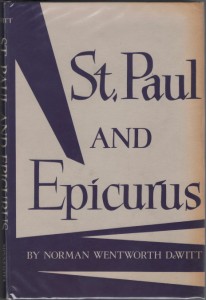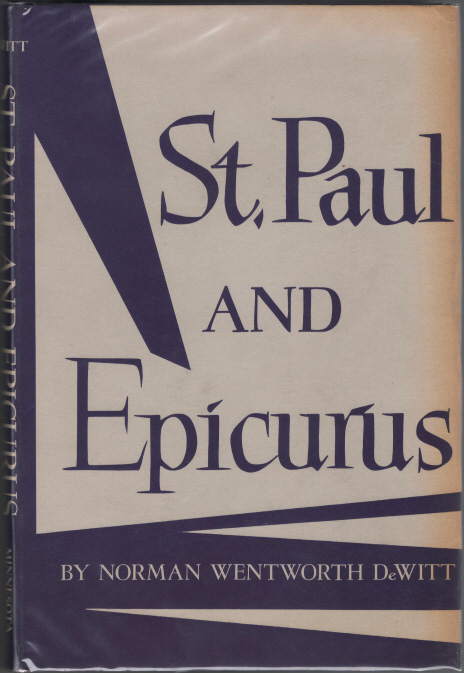St. Paul vs. Epicurus
 Norman DeWitt, who is in my opinion the author of the best book on Epicurus written since the ancient world, also wrote a second book: “St. Paul and Epicurus” (“SPAE”). The entire text is available on-line for free at Epicurus.info. I have always considered SPAE to have been written in a somewhat unusual tone, but I won’t try to get inside DeWitt’s mind as to his motivations for the way he presents the material. On the surface, SPAE seems to be content to explore the ways in which Epicurean doctrine served as a “precursor” to many of Paul’s ideas. The real value of the book, however, is in how it reveals that in the same sense the early Christians reveled in the idea of an “anti-Christ,” Paul of Tarsus, along with the theology he borrowed from Plato or invented himself, is the great “Anti-Epicurus” of Western history.
Norman DeWitt, who is in my opinion the author of the best book on Epicurus written since the ancient world, also wrote a second book: “St. Paul and Epicurus” (“SPAE”). The entire text is available on-line for free at Epicurus.info. I have always considered SPAE to have been written in a somewhat unusual tone, but I won’t try to get inside DeWitt’s mind as to his motivations for the way he presents the material. On the surface, SPAE seems to be content to explore the ways in which Epicurean doctrine served as a “precursor” to many of Paul’s ideas. The real value of the book, however, is in how it reveals that in the same sense the early Christians reveled in the idea of an “anti-Christ,” Paul of Tarsus, along with the theology he borrowed from Plato or invented himself, is the great “Anti-Epicurus” of Western history.
In this post I won’t go into DeWitt’s many interesting observations that show how Paul’s attacks on the “wisdom of men” were essentially attacks on Epicureanism. However, if you have not read SPAE and you have any kind of Christian background, you will find it fascinating to read how such famous phrases such as “Prince of the Power of Air” and the “weak and beggarly elements” refer directly to Epicurus and Epicureanism.
It is to Paul that the modern Christian world owes much of its view of Epicureanism as a “hopeless” creed filled with people who think nothing better of themselves than dirt — random combinations of atoms. Many other nihilistic points of view advocate the same conclusion, but whatever the derivation of the garbage that they advocate, this is one of their most monstrous misrepresentations of Epicureanism. The next time you are confronted with someone putting you down because you’re “just” a random pile of dirt-like atoms too dumb to accept the eternal rewards that they offer for giving up your mind, don’t accept their Pauline premises for a moment. Remember you are as much a part of Nature as any Paul or Augustine who damned what Nature offered to them. In contrast to their nonsense, Epicurus called you to appreciate your place in Nature and to value your own life, for all that you will ever experience, all the pleasure you will ever gain, must come to you in this life, in this world, the only one that matters.
Here are just a few of the important citations that remind us of the value of our lives and our happiness:
- VS 38. “He is of very small account for whom there are many good reasons for ending his life.”
- VS 42. “The same time produces both the beginning of the greatest good and the dissolution of the evil.” (Which DeWitt points out is a repudiation of both the Platonic idea of life before birth and the religious idea of life after death – all the good that is possible to us begins at our birth and ends at our death.)
- VS 14. “We have been born once and cannot be born a second time; for all eternity we shall no longer exist. But you, although you are not in control of tomorrow, are postponing your happiness. Life is wasted by delaying, and each one of us dies without enjoying leisure.”
- VS 45. “The study of nature does not create men who are fond of boasting and chattering or who show off the culture that impresses the many, but rather men who are strong and self-sufficient, and who take pride in their own personal qualities – not in those that depend on external circumstances.”
- VS 47. “I have anticipated you, Fortune, and entrenched myself against all your secret attacks. And we will not give ourselves up as captives to you or to any other circumstance; but when it is time for us to go, spitting contempt on life and on those who here vainly cling to it, we will leave life crying aloud in a glorious triumph-song that we have lived well.”
- VS 52. “Friendship dances around the world bidding us all to awaken to the recognition of happiness.”
- PD 2. “Death is nothing to us; for that which has been dissolved into its elements experiences no sensations, and that which has no sensation is nothing to us.”
- PD 20. “The flesh receives as unlimited the limits of pleasure; and to provide it requires unlimited time. But the mind, intellectually grasping what the end and limit of the flesh is, and banishing the terrors of the future, procures a complete and perfect life, and we have no longer any need of unlimited time. Nevertheless the mind does not shun pleasure, and even when circumstances make death imminent, the mind does not lack enjoyment of the best life.”
- Letter to Menoeceus: ” So we must exercise ourselves in the things which bring happiness, since, if that be present, we have everything, and, if that be absent, all our actions are directed towards attaining it.”
- Letter to Menoeceus: “Death, therefore, the most awful of evils, is nothing to us, seeing that, when we are, death is not come, and, when death is come, we are not. It is nothing, then, either to the living or to the dead, for with the living it is not and the dead exist no longer.”
- Letter to Menoeceus: “The wise man does not deprecate life nor does he fear the cessation of life.”
- Letter to Menoeceus: “We must also reflect that of desires some are natural, others are groundless; and that of the natural some are necessary as well as natural, and some natural only. And of the necessary desires some are necessary if we are to be happy, some if the body is to be rid of uneasiness, some if we are even to live. He who has a clear and certain understanding of these things will direct every preference and aversion toward securing health of body and tranquillity of mind, seeing that this is the sum and end of a blessed life. For the end of all our actions is to be free from pain and fear, and, when once we have attained all this, the tempest of the soul is laid; seeing that the living creature has no need to go in search of something that is lacking, nor to look for anything else by which the good of the soul and of the body will be fulfilled.”
- Letter to Menoeceus: “Exercise yourself in these and related precepts day and night, both by yourself and with one who is like-minded; then never, either in waking or in dream, will you be disturbed, but will live as a god among men. For man loses all semblance of mortality by living in the midst of immortal blessings.”
(All quotes from Epicurus.net)

